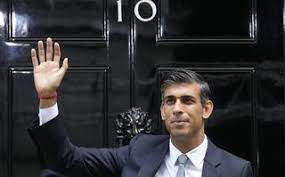The job and the man: On Rishi Sunak
Rishi Sunak should not repeat the mistakes of his predecessors in trying to please his party
At a time when ethnonationalist and majoritarian far-right parties are on the ascent in many democracies across the world, the rise of Rishi Sunak, a man of colour and a practising Hindu, to the premiership of the predominantly white, Christian U.K., has great symbolic value. While his election as Britain’s first non-white Prime Minister points to the readiness of Conservative MPs to look beyond the racial and religious barriers for a solution to the crisis both party and country are in, his victory was particularly welcomed by sections in India, who see some historical fulfilment in a man of Indian origin ruling over India’s former colonial rulers. But the power of symbolism is limited when it is tested with the hard realities of the day. In fact, the very circumstances that led to his rise should themselves serve as a warning for the new leader. He is the fifth Prime Minister since the Tories’ victory in the 2010 general elections, and the third in the last two months. Liz Truss, his immediate predecessor, had also promised to revive the economy but exited in seven weeks amid a hostile market reaction to her policy measures and an open revolt among the Tory MPs.
When the Conservatives won an outright victory in the 2019 elections under Boris Johnson, not many expected Mr. Sunak, a former hedge fund manager, to end up as the party leader in three years. And yet, he is now in 10 Downing Street, presiding over a party that is at war with itself and an economy that has an estimated budget deficit of $45 billion and is headed towards recession. The country is also struggling with a cost-of-living crisis, with inflation hovering around 10%. But he does not have any magic bullet to offer. As the budget deficit remains high and markets are edgy, he is likely to announce cost-cutting measures, but for Britons who are already grappling with high inflation, that would be bad news. And as Russia’s Ukraine war is not expected to wind down any time soon, the energy crisis and inflationary pressure will stay. So, Mr. Sunak will have to walk a fine line between keeping the markets in good faith and providing relief to the public rattled by high inflation, while also opening larger reforms to bring back growth. A tall ask, but Mr. Sunak could at least have begun it on a clean slate. By re-appointing Suella Braverman, an immigration hardliner and an apologist of the empire who was fired by Ms. Truss after weeks into her job, as Home Secretary, Mr. Sunak is sending mixed signals. If he does not want to repeat the fate of his predecessors in an extremely volatile political and economic climate, he should be bold enough not to repeat their mistakes.
